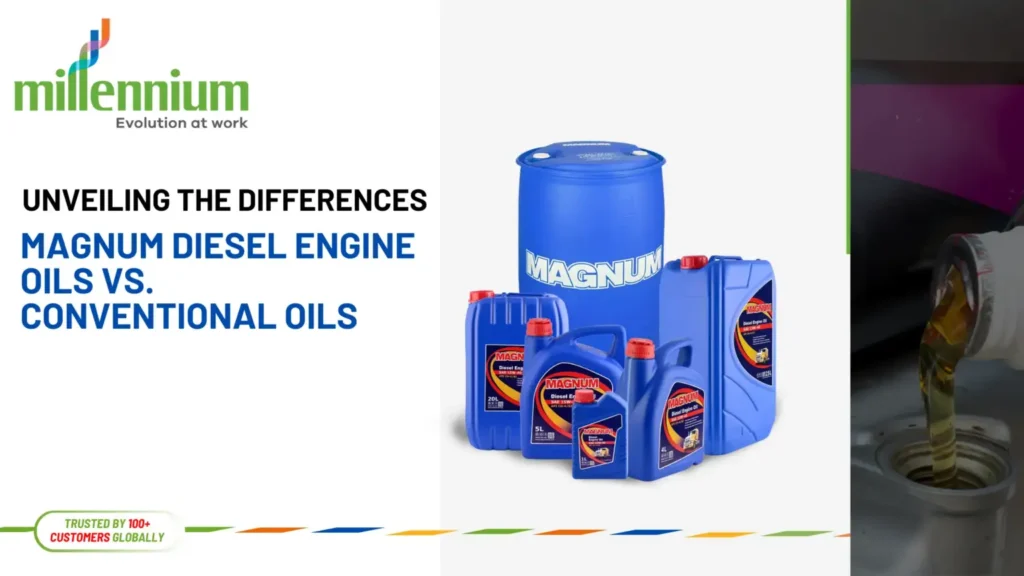Diesel engine oils play a critical role in ensuring the smooth operation and longevity of engines, particularly in heavy-duty and commercial vehicles. Choosing the right oil is essential for optimal performance and protection. With advancements in technology, premium oils like Magnum Diesel Engine Oils have entered the market, offering enhanced features that set them apart from traditional, conventional oils. This guide delves into the key differences between Magnum Diesel Engine Oils and conventional oils, highlighting the unique benefits and drawbacks of each.
Exploring Diesel Engine Oil: A Comprehensive Guide
Diesel engines operate under more intense conditions than gasoline engines, often dealing with higher pressures, temperatures, and loads. As a result, diesel engine oils need to possess specific qualities to handle these harsh conditions. Diesel oils typically have higher viscosity, enhanced detergents, and anti-wear additives compared to oils for gasoline engines.
There are two broad categories of diesel engine oils: conventional oils and synthetic or premium oils like Magnum Diesel Engine Oils. Conventional oils are mineral-based and have been widely used for decades, providing basic lubrication. However, synthetic oils have gained popularity for offering better protection, longer oil change intervals, and improved performance.
Before diving into the specifics of Magnum Diesel Engine Oils, it’s important to understand what sets premium oils apart. They are designed with advanced additive technologies and synthetic base stocks that help them outperform conventional oils in several aspects, including wear resistance, temperature stability, and engine cleanliness.
Magnum Diesel Engine Oils: Features and Benefits
Magnum Diesel Engine Oils are engineered for high-performance diesel engines, particularly those found in heavy-duty vehicles, trucks, buses, and off-road equipment. These oils offer several key features that make them stand out in the market:
Advanced Additive Technology: Magnum oils use a carefully formulated combination of detergents, dispersants, and anti-wear additives to protect engine components under extreme conditions. These additives help prevent the buildup of sludge, soot, and carbon deposits, ensuring the engine remains clean even after extended periods of operation.
Superior Viscosity Stability: Magnum Diesel Engine Oils are known for their ability to maintain consistent viscosity in both high and low temperatures. This ensures that the oil flows easily when the engine is cold and provides a protective film when the engine is running at high temperatures, reducing the risk of wear and tear on critical components.
Extended Drain Intervals: One of the significant advantages of Magnum oils is their ability to last longer between oil changes compared to conventional oils. This means fewer oil changes, reduced downtime, and lower maintenance costs for vehicle owners.
Oxidation and Thermal Stability: Diesel engines generate a lot of heat, which can cause oils to break down over time. Magnum oils are designe to resist oxidation and thermal degradation, keeping the oil effective for longer and preventing the formation of harmful acids that can corrode engine parts.
Enhanced Fuel Efficiency: The improved lubrication and reduced friction offered by Magnum oils help engines run more efficiently. This can lead to better fuel economy, which is especially beneficial for fleet operators looking to minimize fuel costs.
Compatibility with Modern Emission Control Systems: Many modern diesel engines are equipped with emission control systems like diesel particulate filters (DPF) and selective catalytic reduction (SCR) systems. Magnum Diesel Engine Oils are formulate to work in harmony with these systems, ensuring that they do not become clogged or compromised by oil residue or soot buildup.
Conventional Oils: Pros and Cons
Conventional oils, also known as mineral oils, have been the standard choice for decades. They are derived from crude oil through refining processes and offer basic engine protection. Here are the key pros and cons of using conventional oils in diesel engines:
Pros:
Affordability: Conventional oils are typically less expensive than synthetic or premium oils like Magnum. For budget-conscious consumers or businesses managing large fleets, this can be a significant consideration.
Wide Availability: Conventional oils are readily available at most auto parts stores and service centers, making them a convenient option for many vehicle owners.
Proven Reliability: Conventional oils have been use for many years and provide reliable engine lubrication for a wide range of diesel engines.
Cons:
Shorter Drain Intervals: Conventional oils require more frequent changes compared to synthetic oils. This means more frequent downtime for maintenance and higher overall costs in the long run.
Poor High-Temperature Performance: Conventional oils tend to break down more quickly at high temperatures, leading to reduced protection for engine components and potentially shorter engine life.
Increased Sludge Formation: Conventional oils are more prone to forming sludge and deposits, especially in high-stress diesel engines. Over time, this can lead to clogged oil passages, reduced lubrication, and increased wear on engine components.
Limited Compatibility with Modern Emission Systems: Some conventional oils may not perform well in modern diesel engines equipped with advanced emission control technologies. The higher soot content and poorer quality of these oils can negatively impact systems like DPFs and SCRs.
Comparison: Magnum Diesel Engine Oils vs. Conventional Oils
Performance:
Magnum Diesel Engine Oils outperform conventional oils in terms of high-temperature stability, viscosity control, and protection against wear and deposits. This makes them particularly suitable for high-performance or heavy-duty diesel engines, where operating conditions are more extreme.
Engine Cleanliness:
Magnum Diesel Engine Oils feature advanced detergents and dispersants that help keep the engine cleaner by reducing the buildup of sludge, carbon, and soot. Conventional oils, on the other hand, may allow deposits to accumulate more easily, potentially leading to engine issues over time.
Oil Change Intervals:
One of the most significant advantages of Magnum oils is their extended drain intervals. This reduces maintenance frequency and cost, whereas conventional oils require more frequent changes to maintain their protective properties.
Cost Efficiency:
While conventional oils may have a lower upfront cost, the longer drain intervals, better protection, and potential for improved fuel efficiency offered by Magnum oils can lead to overall savings in the long run. For heavy-duty operations, the benefits of fewer oil changes and enhanced engine performance may outweigh the initial investment in premium oil.
Compatibility with Modern Engines:
Magnum Diesel Engine Oils are formulate to meet the requirements of modern diesel engines with emission control systems, making them a better choice for newer vehicles. Conventional oils may not provide the same level of protection and may even harm these systems over time.
Conclusion
When it comes to choosing between Magnum Diesel Engine Oils vs. Conventional Oils, the decision largely depends on the specific needs of your diesel engine. Magnum Diesel Engine Oils offer superior performance, longer oil change intervals, and better protection, making them ideal for high-performance or heavy-duty applications. While conventional oils are more affordable upfront, their shorter lifespan and limited high-temperature performance make them less suitable for modern diesel engines. For those seeking to extend engine life, improve fuel efficiency, and reduce maintenance costs, Magnum Diesel Engine Oils are a worthwhile investment, especially for engines that endure extreme conditions or require the latest emission control technologies.


